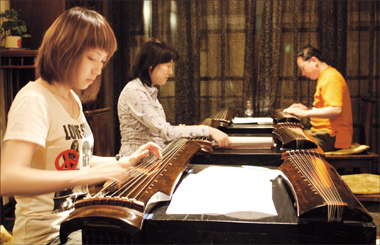 |
|
White-collar workers learn playing the guqin (Chinese zither) at You Huang Li guqin salon. Nowadays, more and more white collars in pursuit of a slow life show great interest in traditional Chinese instrument. [Shanghai Daily]
|
On a sultry afternoon, a sweet ancient string melody flows from a two-story garden house at the leafy crossroads of Huaihai Road M. and Wanping Road, the plucked notes lingering in the air.
Fish glide in a pond shaded by bamboo. Visitors tread softly in the garden lest they ripple the peaceful surroundings.
The music comes from an ensemble of four white-collar workers who are learning to play the guqin, a seven-stringed zither that has existed for more than 3,000 years.
One of the students at You Huang Li guqin salon is Liu Huangli, a 38-year-old nine-to-five accountant, who travels one hour each week to the salon from her home in suburban Songjiang District.
"Playing the guqin is a way to explore the harmony between man and nature and the essence of the universe," says Liu, who is also interested in traditional Chinese medicine and calligraphy. She has been studying for more than a year.
This musical oasis is not only a place to learn to play the ancient instrument, but equally important a gathering place for those who love traditional Chinese music and culture. It opened last November and has around 300 students.
The guqin is an instrument of great subtlety and refinement and was favored as the instrument of scholars and literati; it is sometimes called the "instrument of the sages" and is associated with Confucius.
The guqin (gu meaning ancient, qin meaning zither) is a plucked string instrument without frets and having a range of around four octaves. It is distinct from the guzheng, which has frets.
Playing the guqin was the first among the four arts of "elite" culture that scholars were required to master in ancient times. The other three are qi (chess), shu (calligraphy) and hua (painting).
In 2003, guqin music was recognized by UNESCO as one of the masterpieces of world's oral, intangible heritage. In 2008, the guqin itself and its music were listed among the 90 representative intangible cultural heritages of humanity by the UNESCO.
Liu became fascinated by the guqin when she read ancient poetry about the instrument in textbooks during middle school. Reading a magazine article about guqin on her daily Metro commute one day, she was inspired to learn to play.
"I'm not a fanatic but I am enamored and steadily reverent and this feeling may last a lifetime," says Liu who now can play four or five pieces. She is also learning on her own and practicing for an hour or two every day.
"Playing guqin is calming and keeps one balanced and not distracted by either honors or adversities," she says.
In her pursuit of traditional culture, Liu values a "slow-paced" life over hectic urban pursuits. She is also interested in health and has dipped into the TCM classic, "Huangdi Nei Jing" ("The Yellow Emperor's Classic of Internal Medicine"). A deeper study of calligraphy is on her list.
Word-of-mouth sends most students to the guqin salon. They range in age from five to 60, says Wu Yunlin, a course consultant who is also an experienced player.
The course is divided into 12 classes for three months. Most students are male; the literati who played the guqin were overwhelmingly male.
The salon displays and sells guqins ranging from 6,000 yuan (US$880) and also displays one valued at 500,000 yuan. Casual visitors are welcome to appreciate the ancient instruments on show. Tea is also offered at 20-30 yuan.
The timbre depends mainly on the wood, usually in paulownia (princess tree) or cedar. It receives 20 to 30 coats of lacquer.
Guqin music scores embody fingering styles; different fingering is possible for the same melody. The system of notation shows finger positions and stroke techniques in characters, rather than notes.